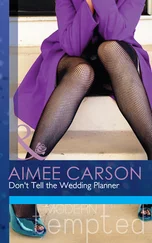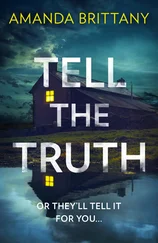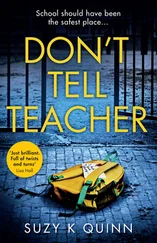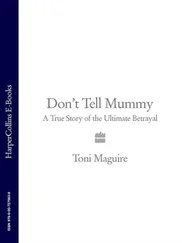“That is no concern of mine,” said the woman. “Now please show me into your root cellar.”
“And what would happen if we don’t show it to you?” asked Mama.
“You do not want to test me on that,” said the woman.
Mama opened her mouth to say something else, but then closed it again. As we walked around to the back of the house, the woman noticed our chickens. “How many?” she asked.
“Two,” I said, gulping.
“Any cows?”
“One,” said Maria.
The woman noted that on her clipboard, then looked up, frowning. “So it’s a mother and two daughters who live here, that’s it?”
Mama nodded.
“That one can show me the root cellar,” she said, pointing to me.
I opened up the double wooden doors and stepped down the rickety ladder into the cellar, all the time trying to control my anger. Maybe this horrible woman would fall down our ladder and break her neck. But if that happened, would we be punished?
I swallowed back my anger and steadied the woman’s elbow so she wouldn’t slip. I forced myself to be calm as she checked our shelves with a flashlight and wrote the inventory on her clipboard. She kicked at the dirt floor in a number of places and knocked on the walls. I had buried the can of pork from Frau Schneider in the floor, but the woman didn’t find it.
“You can’t keep any of what’s in this cellar,” she said to Mama once she stepped out. “But since you are widowed with two daughters, I’ll let you keep your cow and chickens.”
Mama’s face went a pasty white, but she managed to say “Thank you.”
I watched in stunned silence as the woman jotted a few more things on her clipboard, then put her pen away. Was this the Hunger Plan, to take food away from us so that we died? I thought of the coming winter — how would we possibly get through it?
As the woman stood there, Volksdeutche workers with a horse-drawn wagon arrived. She directed them to our cellar and we watched helplessly as they loaded up all of our food.
The woman turned and was about to leave, but then hesitated. At first I thought she might change her mind and let us keep some of our produce, but she said to Mama, “You should send one of your girls to work in Germany.”
Mama’s mouth was set in a grim line and her knuckles were clenched white. “Why would I do that?” she asked.
“Your daughter would be fed and paid. She could send money home.”
It took Mama a moment to answer. “Thank you for the suggestion.”
When the woman left, Mama turned to us and said, “I don’t believe her. You see how badly they treat us here. Why would they treat us any better in Germany? They will not defeat us.”
I thought about Mama’s words as I walked Krasa to the pasture that evening. I was determined to be as brave as Mama. I would not let the Nazis defeat me, but I just wished they had left us with a bit more food.
At least we still had Krasa and the chickens. We could still sell some of the milk while we had it, and we could sell eggs. With the money from that, we could buy potatoes from Auntie Polina and her neighbours.
With our food gone, working for the Commandant became even more important. He didn’t pay us much, but the small amount we did get could mean the difference between living and starving.
I led Krasa to graze at Auntie Iryna’s pasture and stood on the high rock, looking into the distance. The newly widened road stretched towards Lviv. It had been so easy for the Nazi and Soviet armies to invade us even with narrow roads, but now we were wide open for destruction.
I shaded my eyes and squinted at the farms surrounding Viteretz. Soldiers were guiding teams of farmers to harvest, just like they used to under the Soviets And just like then, the produce was being loaded into trucks and driven away. They were confiscating the farmers’ produce as well?
My stomach did a sick flip. What would our farmers live on? And what would they have left to sell to us townsfolk? This was a disaster. Money can’t buy food that doesn’t exist. Everyone but the Nazis would be hungry this winter. How would we get through February and March and half of April without even milk?
When I got back with Krasa I told Mama and Maria what I’d seen.
“They will not defeat us,” said Mama, her eyes welling with tears. “We can forage for wild roots and plants.”
“Will we still be able to sell some of the milk and eggs?” I asked.
“Our neighbours will need that food from us,” said Mama. “Although we will need it too. We’ll sell some milk, but we’ll have to make more cheese than usual, so we can store it.”
Throughout this exchange, Maria sat quietly, but a big tear fell onto the table. “We’re going to starve in the spring,” she said, wiping her eye with the back of her hand. “If I were brave enough, maybe I’d go to Germany like the woman suggested. I could send money back to you and Krystia.”
“No,” said Mama. “I want my daughters here with me. Let’s just try to get by one day at a time. The rest is up to the grace of God.”
Chapter Fourteen
The Falcon’s Call
Maria had taken to walking Krasa to the pasture with me in the evenings. This was partly because Mama was now worried about me being alone at dusk, as the Nazis were showing their true faces. But also because Maria wanted to. This was a big decision for her, and I was so proud of my little sister. It was also nice to have the company.
I would hold on to Krasa’s tether and Maria would walk in front, spying out anything useful on the road or in the ditch. She would occasionally find a stray hen’s egg, but also some items that had fallen off the trucks and carts of the people coming into town. A baby’s rattle or someone’s cane didn’t interest her, but once Maria found a coil of dried sausage; another time she found a dented tin of sardines.
Along the way she’d tell me things she didn’t want to say in front of Mama, like how she hated working at the Commandant’s.
“I hate it too,” I told her. “But working there probably saves us from worse jobs. Besides, we can sometimes hear useful things.”
Once we’d get to the pasture and Krasa was grazing, we’d look for mushrooms, berries, nettles — anything that could be eaten. And it was nice to have two sets of eyes for this. We’d also play games, like seeing who could jump the farthest and who could run from one end of the pasture to the other without tripping.
One evening as Krasa munched on parched grass in our pasture, and Maria and I searched for edible shoots and roots, a shadowy figure appeared in the bushes. My heart nearly stopped beating.
“It’s okay, Krystia. It’s just me.”
“Borys?”
I ran to hug my cousin. He picked me up and twirled me around, just like he used to when we were younger. I breathed in his scent of smoke and tree sap and realized how much I missed having him around.
“It’s good to see my favourite oldest cousin,” he said, putting me back on the ground.
“What about me?” said Maria with mock indignation.
“You’re my favourite youngest cousin,” he said, pinching her cheek.
He bent his knees until we were all eye level. “Let’s have a staring contest. I know I’ll win, because girls blink more than boys do.”
This was a game we had played as children, and it was Borys who usually blinked first. The trick to winning was to squint a little bit so your eyes didn’t get dry. I put my hands on my hips, squinted just enough and stared him down. Maria had a different method — kind of cheating, but Borys always let her do it. She’d hold her eyelids up with her fingers. For a full minute, Maria and I stared into Borys’s eyes. I counted to sixty without blinking.
Читать дальше
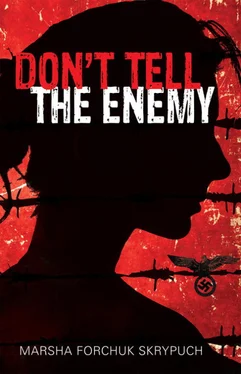


![Quiet Billie - Don't mistake the enemy [СИ]](/books/421973/quiet-billie-don-t-mistake-the-enemy-si-thumb.webp)




